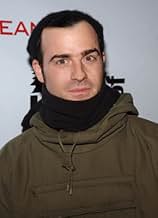Ajouter une intrigue dans votre langueEast of Havana is a blunt, unflinching close-up on the lives of three young rappers compelled to address their generation's future from the confines of a Cuban ghetto. Soandry, Magyori, and ... Tout lireEast of Havana is a blunt, unflinching close-up on the lives of three young rappers compelled to address their generation's future from the confines of a Cuban ghetto. Soandry, Magyori, and Mikki are the defacto leaders of Cuba's rebellious underground hip hop movement. Possessin... Tout lireEast of Havana is a blunt, unflinching close-up on the lives of three young rappers compelled to address their generation's future from the confines of a Cuban ghetto. Soandry, Magyori, and Mikki are the defacto leaders of Cuba's rebellious underground hip hop movement. Possessing the undeniable talent and charisma of pop icons, these fearless performers push self-exp... Tout lire
- Réalisation
- Scénario
- Récompenses
- 1 nomination au total
Avis à la une
In the build up to a hip-hop festival on the island, and just before Hurricane Charley, the film interviews native Cubans. It explores the poverty that many have faced one woman laughs about how she is very good at making a meal for the whole family out of a single banana. It dwells particularly on the 90's and the period of crisis then that Cuba went through economically.
Is it a 'fly-on-the-wall' documentary, as the makers claim, or does it insert its own agenda; and if it does, are its assertions consistent with known facts on the one hand, or an effective challenge to them on the other?
I was very lucky to meet Ms Theron and the two writer-directors and put some of my concerns to them, but the claim that it is a fly-on-the-wall documentary is hard to sustain. The film is interrupted by black screens with writing, giving us a very specific version of 'facts.'
The US has a very particular view of Cuba that is not shared by the UN or major NGOs. In an attempt to bring down the government of Castro, it has enacted an economic blockade for 45 years. The previous, US-friendly government, was more corrupt than that of Fidel Castro, but at that time Cuba had an effective trade (around 67%) with the US that kept money flowing into the country. When Castro came to power, that was blocked, in the massive, longest running economic embargo the US has ever implemented, and one condemned by nearly every country in the world as inhuman or in breach of international law. At the 2005 United Nations General Assembly, for instance, 182 countries voted to condemn the embargo (only three nations supported the US).
For many years, Cuba managed in spite of the blockade, but in the 90's the US stepped up pressure as ordinary Cubans experienced extreme poverty, concomitant with a drop in foreign aid from the USSR as the Soviet Bloc started to dissolve.
This film appeared at the Festival within days of President Bush announcing $80 dollars not in aid, but to 'boost democracy' by helping the people in their "transition from repressive control to freedom." Was the film part of that kind of thinking?
Many assertions are correct, eg the period of poverty, but in dealing with the causes of that poverty, the film points a vague finger at Russia and avoids putting any blame on the American embargo. I put it to Ms Theron and the two directors, this is political whitewash isn't it?
The answer was long and not very convincing. Firstly I was assured that just because the embargo wasn't mentioned on the black screens it didn't mean it wasn't addressed (I must have blinked in this bit). Then Charlize said they never wanted to make a political film. Really. Did I think it was a pro-American film she asked me? Yes, I did. "If you really made a film about the embargo it wouldn't make sense," says Charlize.
The blackboard in question that interrupts the film says in firm, clear writing up: "In 1990 Russian aid to Cuba ended provoking a crisis." No mention of the embargo. No mention of the U.S. stepping up efforts with extra legislation to make the Cubans' lot even worse. The United Nations, the World Health Organisation, Oxfam International have no problem making sense of it, but these filmmakers didn't understand it. Worrying, especially as the film is in competition for a EIFF Documentary Award.
Can the film can reasonably called 'pro-American'?
1) It's about a music form associated primarily with the US. 2) The interviews selected show people who are largely ignorant of world affairs, even the US policies affecting their own country. 3) Most worryingly, the film takes an emotive issue (malnutrition), dodges clear US culpability, and subtly suggests that the blame rests solely with Fidel Castro's repressive regime or the drying up of aid from Russia.
What about other 'factual' assertions? An American news clip reports hardly any damage in Cuba from Hurricane Charley and we cut straight to a blown down tree and extended interviews suggesting Hurricane Charley was merely a pretext for Castro to object to the hip-hop festival. Having found so much spin elsewhere in the film, I decided to check this as well.
The BBC, MS-NBC and the Red Cross, all of whom had reporters in the ground, are at odds with East of Havana's presentation of facts. They told stories of hundreds of thousands of people evacuated, 798 schools and 312 health centres were damaged, 70,000 homes damaged, 8,000 trees were uprooted and 95 per cent of sugarcane, bean and banana crops as well as electricity, water and telephone networks severely affected.
More than just a pretext perhaps. It is unclear where East of Havana got its erroneous news clip of a few seconds but, whatever clampdowns Castro may or may not have initiated, his government's response to the hurricane looks pretty competent.
On the pluses, East of Havana shows a little of the interesting variation of Cuban hip-hop which seems to contain more gentle love songs than its US counterpart, but the lack of information and weight of misinformation is sufficient to make it an embarrassment as a documentary. A simple recording of interviews and rap songs, whatever the filmmakers' agenda, might have sufficed, but the 'message' factor at odds with established and verifiable facts rather less so.
"I'm a lover of documentaries," Ms Theron enthused. Based on this effort, I hope she means watching them rather than producing them.
Throwout the years the left has dedicated itself to repeat the Castro story that Cuba was a miserable pathetic case and his drastic socialist a.k.a. communist measures have been made to solve or make something out of Cuba. This is a farce. Just a look at todays crumbling Havana more than reveals that this was once an affluent first world euro-style metropolis unlike any other in a long radius. Also the then new high raise buildings on the Vedado district and the amount of old American cars from Chevrolets to Cadillacs still around from its capitalistic days more than shows evidence of a past with a solid economy and a strong middle class. Did Cuba have poverty? Of course, but so did the U.S.A. and Europe. Cuba was never a case for world vision and it never had the huge social differences that are many times so choking in other Latin American countries.
Despite Cuba's achieved economical maturity that was the envy of many other Caribbean and Latin American countries, politically it was the same circus as the rest, and for it, it paid the highest praise or them all. During this period the president was a black man called Batista,and although Batista was categorized as a dictator because he stole his second term and ignored the Cuban constitution, he was truly nothing more than the typical corrupt politico seen in all of Latin America. Batista's actions created open discontent and it was not at all that hard to curse him out and take him down, just shows his level of "dictator". This was the platform that Castro used to get to power promising no more corruption, future elections, and respect for the Cuban constitution, lets see, it is now 2007, yeah a very honest man. Not only one hell of a commi tyranny but a monarchy since his brother is appointed in line to continue it.
One of the biggest blames for Cuba's obvious poor and decadent state (where Havana buildings are literally falling on people) is the U.S. embargo, especially by the mouths of communist themselves after the fall of the U.S.S.R. Now I ask, wasn't it Castro the one that expropriated (stole without pay) all businesses in Cuba -national & foreign- and declared ALL private property illegal. And with doing this told Americans and all outsiders to go to hell. He purposely provoked the embargo, destroyed the Cuban infrastructure and economy, purposely isolated the Cuban people, and turned Cuba into a Russian satellite nation. Why? To easily perpetuate a strong tyranny, there is not much science to this. Go ask the other commi wacko in North Korea why he also isolates and slaves his people, is like, duhhh. All the embargo finger pointing has come mainly after the fall of the U.S.S.R and with it the disappearance of the money they gave Castro, the commis now blaming the U.S.A pretending they forgot the real story. Now I also ask, so much poverty, decrepitude, and destruction just since the fall of the U.S.S.R in 1989. COME ON, PLEASE. Cuba has been looking pretty dawn bad from a pretty long time, ever since Castro took power to be exact. Where did all the BILLIONS of $ the U.S.S.R gave Castro over time go to? In military, trying to export his revolution. Remember Grenada, remember Angola, remember the Salvadorian Civil War, remember where the Colombian guerrilla got supplied and trained during the 60s and 70s, Cuba was the name.
The U.S. embargo does not mean anything for the Cuban people as long as they are subjugated as slaves by a communist elite that runs and controls everything by ANY means possible. The entire world visits and does business with Cuba, has this changed the circumstances for freedom, change,the Cuban people and political prisoners, etc, NO, but Castro and his accomplices have bigger bank accounts, that is all. You have to understand the system to understand the reality, it is just slave-masters controlling slaves in Cuba. This are the words of a Cuban, not a lefty arrogant Hollywood liberal who thinks to know more than anyone because he reads propaganda, but then has no brains to analyze it. Most Cuban exiles are for the embargo because they know how the system works and they know that with embargo or no embargo under Castro they are just slaves. Thee embargo is Castro's problem and interest. The destruction of Cuba is due to Fidel, his surrounding scum, and the U.S.S.R as this documentary calmly points out. The Cuban rappers are not allowed to travel or speak freely, and THAT IS FOR A REASON gentlemen. See therealcuba.com for more info.
Let me start by stating that I saw the movie last night and I loved it. I did not see it as being biased. It is simply the story of poor black Cubans from Alamar-- a black slum "East of Havana" thereby the title-- and their struggles to get a Rap Festival going on in a country where repression and censorship is the rule-of-thumb. That they are unhappy with the totalitarian dictatorship and voice their opinion on it is not surprising. It's easy to be critical of people living under a repressive government if one like Mr. Docker, lives in a democracy like the U.K. Apparently, Mr. Docker wants the folks in the documentary to repeat the Castro mantra that the U.S. embargo-- which Mr. Docker wrongly calls a "blockade"--is the culprit of all of Cuba's problems. Cubans are not stupid. They understand that Castro and his tyranny with it's ridiculous laws is the real culprit. What happened to the billions of dollars that the former U.S.S.R. gave Cuba? Did you know that the U.S.S.R. gave Castro more money during its 30 year patronage of Cuba than the U.S. gave all of Europe under the Marshall plan? Cubans know the truth. What this movie demonstrates is that poor black Cbuans whom Castro claimed that he made his revolution for are very unhappy with his rule and like anyone else yearn for democracy, freedom and prosperity. By the way, I understand that since the movie was made, any independent rappers have been suppressed.
I tip my hat off to the brave men and women who had the courage to voice their opinions on film in a country where any form of dissent can lead to years in the most sordid prisons.
It's a great movie. I recommend all to go see it.
Meilleurs choix
Détails
Box-office
- Budget
- 500 000 $US (estimé)
- Montant brut aux États-Unis et au Canada
- 11 550 $US
- Week-end de sortie aux États-Unis et au Canada
- 4 800 $US
- 4 févr. 2007
- Montant brut mondial
- 11 550 $US
- Durée1 heure 22 minutes
- Couleur
Contribuer à cette page






















